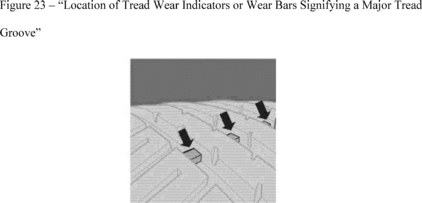Title 49
SECTION 393.75
393.75 Tires.
§ 393.75 Tires.(a) No motor vehicle shall be operated on any tire that -
(1) Has body ply or belt material exposed through the tread or sidewall,
(2) Has any tread or sidewall separation,
(3) Is flat or has an audible leak, or
(4) Has a cut to the extent that the ply or belt material is exposed.
(b) Any tire on the front wheels of a bus, truck, or truck tractor shall have a tread groove pattern depth of at least 4/32 of an inch when measured at any point on a major tread groove. The measurements shall not be made where tie bars, humps, or fillets are located.
(c) Except as provided in paragraph (b) of this section, tires shall have a tread groove pattern depth of at least 2/32 of an inch when measured in a major tread groove. The measurement shall not be made where tie bars, humps or fillets are located.
(d) No bus shall be operated with regrooved, recapped or retreaded tires on the front wheels.
(e) A regrooved tire with a load-carrying capacity equal to or greater than 2,232 kg (4,920 pounds) shall not be used on the front wheels of any truck or truck tractor.
(f) No motor vehicle may be operated with speed-restricted tires labeled with a maximum speed of 55 mph or less in accordance with S6.5(e) of FMVSS No. 119 at speeds that exceed the rated limit of the tire.

(g) Tire loading restrictions (except on manufactured homes). No motor vehicle (except manufactured homes, which are governed by paragraph (h) of this section) shall be operated with tires that carry a weight greater than that marked on the sidewall of the tire or, in the absence of such a marking, a weight greater than that specified for the tires in any of the publications of any of the organizations listed in Federal Motor Vehicle Safety Standard No. 119 (49 CFR 571.119, S5.1(b)) unless:
(1) The vehicle is being operated under the terms of a special permit issued by the State; and
(2) The vehicle is being operated at a reduced speed to compensate for the tire loading in excess of the manufacturer's rated capacity for the tire. In no case shall the speed exceed 80 km/hr (50 mph).
(h)(1) Tire loading restrictions for manufactured homes built before January 1, 2002. Manufactured homes that are labeled pursuant to 24 CFR 3282.362(c)(2)(i) before January 1, 2002, must not be transported on tires that are loaded more than 18 percent over the load rating marked on the sidewall of the tire or, in the absence of such a marking, more than 18 percent over the load rating specified in any of the publications of any of the organizations listed in FMVSS No. 119 (49 CFR 571.119, S5.1(b)). Manufactured homes labeled before January 1, 2002, transported on tires overloaded by 9 percent or more must not be operated at speeds exceeding 80 km/hr (50 mph).
(2) Tire loading restrictions for manufactured homes built on or after January 1, 2002. Manufactured homes that are labeled pursuant to 24 CFR 3282.362(c)(2)(i) on or after January 1, 2002, must not be transported on tires loaded beyond the load rating marked on the sidewall of the tire or, in the absence of such a marking, the load rating specified in any of the publications of any of the organizations listed in FMVSS No. 119 (49 CFR 571.119, S5.1(b)).
(i) Tire inflation pressure. (1) No motor vehicle shall be operated on a tire which has a cold inflation pressure less than that specified for the load being carried.
(2) If the inflation pressure of the tire has been increased by heat because of the recent operation of the vehicle, the cold inflation pressure shall be estimated by subtracting the inflation buildup factor shown in Table 1 from the measured inflation pressure.
Table 1 - Inflation Pressure Measurement Correction for Heat
| Average speed of
vehicle in the previous hour |
Minimum inflation pressure buildup | |
|---|---|---|
| Tires with 1,814 kg (4,000 lbs.) maximum load rating or less | Tires with over 1,814 kg (4,000 lbs.) load rating | |
| 66-88.5 km/hr (41-55 mph) | 34.5 kPa (5 psi) | 103.4 kPa (15 psi). |